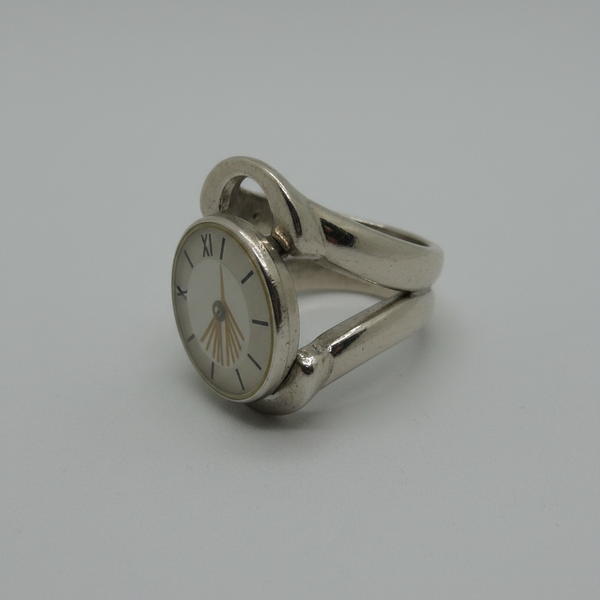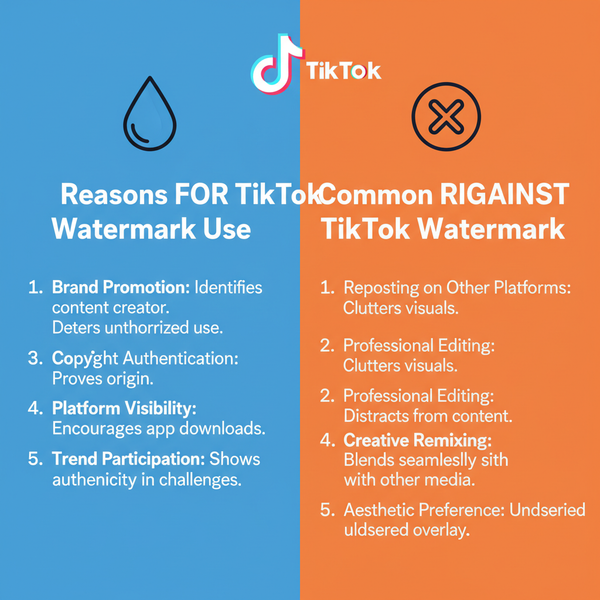What Does the Saying Touch Grass Mean? Origin, Use, and Tone
Explore the meaning, origin, and tone of the internet slang “touch grass,” plus etiquette, cultural context, and digital wellbeing alternatives.
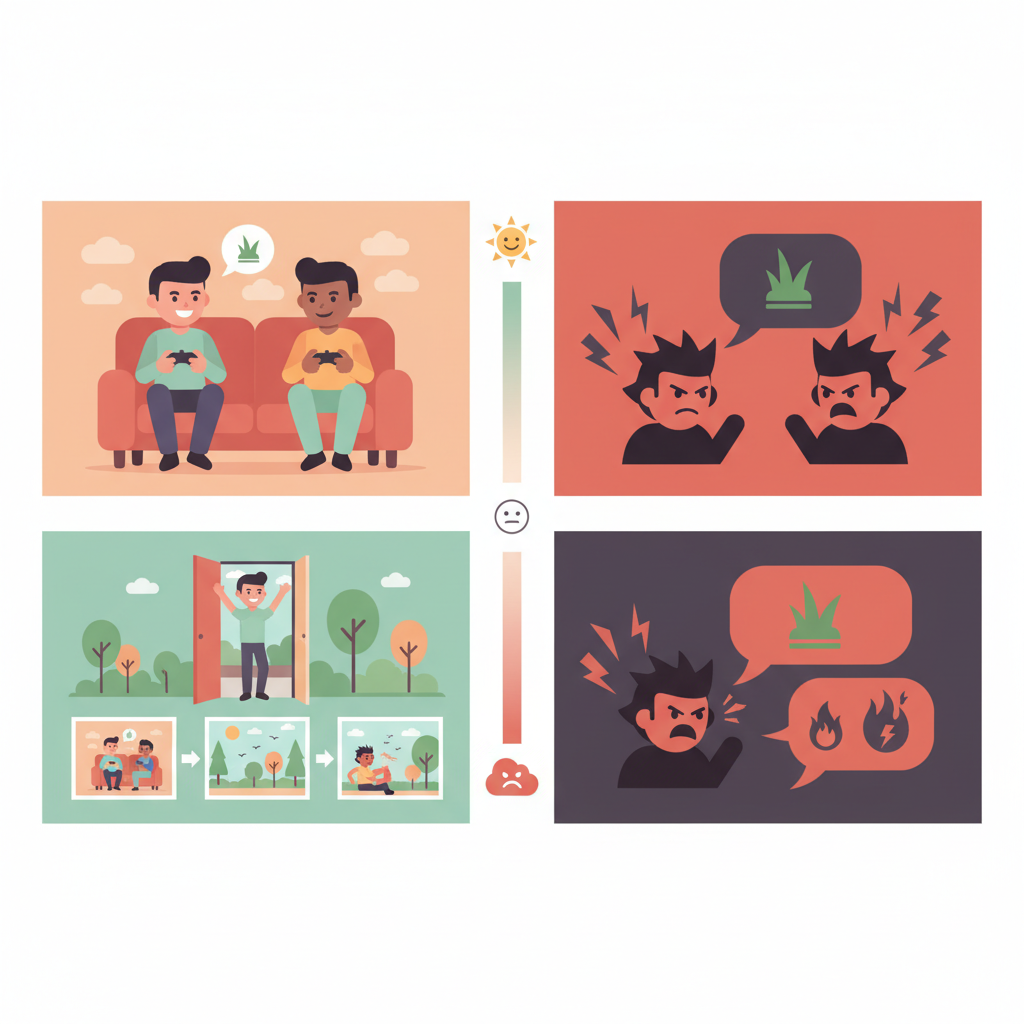
Social feeds are full of the phrase “touch grass,” but what does the saying touch grass mean, where did it come from, and how should you use it? This guide explains the meaning, origin, tone, and etiquette of the “touch grass” meme—plus inclusive alternatives and practical digital wellbeing tips.
What Does the Saying “Touch Grass” Mean? Origin, Use, and Tone
If you’ve scrolled through social feeds lately, you’ve likely seen someone told to “touch grass.” So, what does the saying touch grass mean? In internet slang, it’s a playful (or sometimes snarky) nudge telling someone to step away from online spaces, go outside, and regain perspective. The idea is simple: when discourse gets heated, when doomscrolling spirals, or when attention is trapped in niche debates, the remedy is a brief reset in the real world—preferably somewhere with fresh air and greenery.

At its core, “touch grass” implies: “You’re too online right now. Take a break, breathe, and come back with clearer judgment.” It’s often deployed when someone appears “terminally online,” letting social media intensity distort their tone, priorities, or sense of proportion.
The Core Intent Behind “Touch Grass”
- Suggest a healthy pause from feeds, threads, or chats
- Break cycles of outrage, obsession, or unproductive debate
- Shift attention from screen stress to embodied reality
- Encourage grounding—through nature, movement, or mindful breathing
It’s not literally about blades of grass; it’s about the symbolism of stepping outside the attention economy for a moment to reset.
Origin of “Touch Grass” in Gaming and Meme Culture
The phrase rose to prominence across gaming forums, Reddit threads, Twitter replies, and Twitch chat circa the mid-2010s. It synced naturally with chat vernacular—short, punchy, and performative—and spread quickly as a meme-able retort. Early uses often targeted players melting down over patch notes, meta changes, or balance debates. Reddit and Twitter clapbacks amplified it; Twitch streamers and their communities turned it into a familiar in-joke.
Urban Dictionary entries (from roughly the late 2010s) helped cement both the meaning and the tone: part gentle ribbing, part dismissive snark. By the time TikTok scaled up, “touch grass” was common in comments, stitches, and duets, shot through with meme edits and reaction videos.
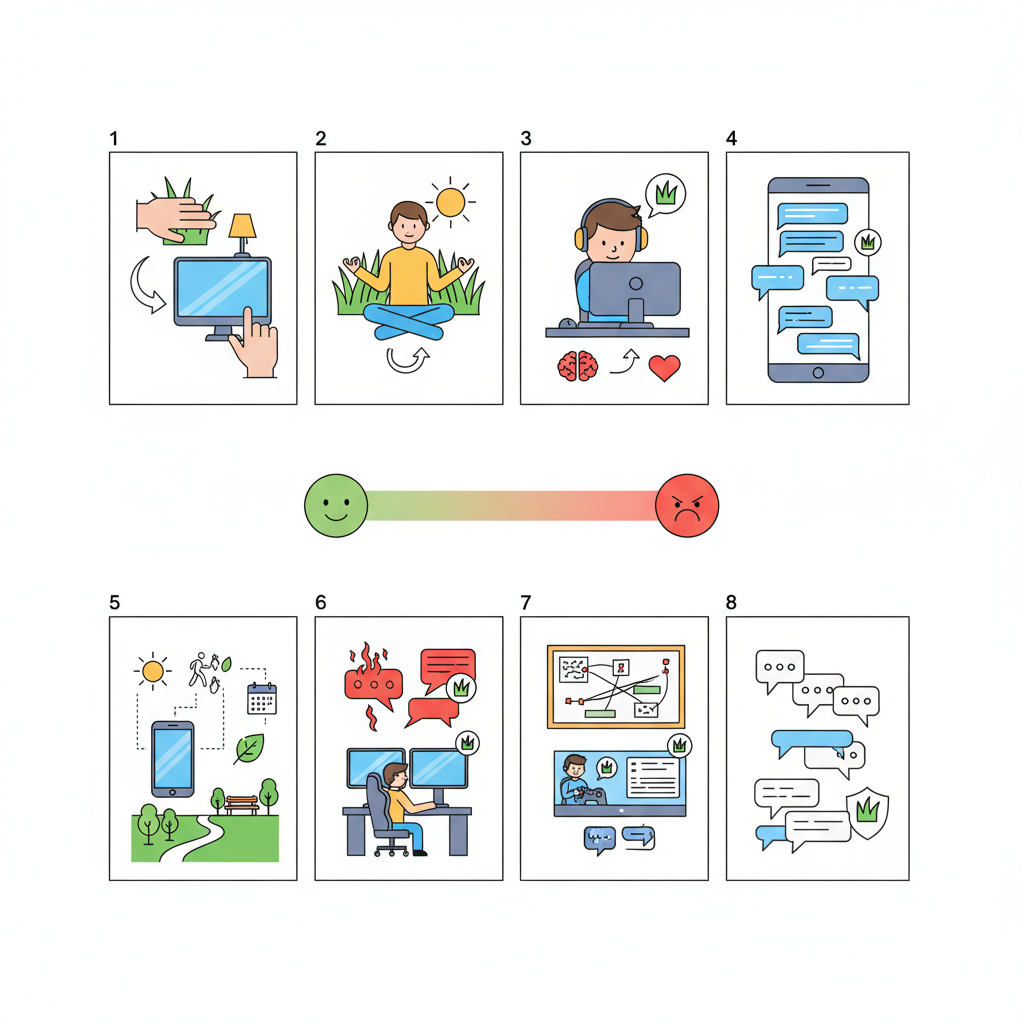
Mainstream Spread and Chat Vernacular
- Gaming forums: used to defuse saltiness, rage quits, and meta fights
- Reddit: deployed in flair wars and comment storms
- Twitter/X: a staple of clapbacks and quote-tweet dunking culture
- Twitch: chat shorthand during heated matches or streamer controversies
- TikTok: comment culture normalized quick, meme-ready “touch grass” cues
Part of a Broader Digital-Health Trend
“Touch grass” fits a wider family of quips like “go outside,” “log off,” and “get off the internet.” Each reflects growing anxiety about digital overwhelm: news fatigue, outrage algorithms, and the attention economy’s pressure cooker. These phrases signal a desire for boundaries and breaks—even if humor sometimes masks their seriousness.
Tone Matters: From Playful Ribbing to Hostile Dismissal
“Touch grass” can land very differently depending on who says it, how it’s said, and the relationship between participants.
- Playful among friends: teasing that nudges without shaming
- Constructive nudge: “Hey, take a breather—this looks stressful”
- Hostile dunk: used to silence or embarrass in public threads
- Gatekeeping: dismisses newcomers or “casuals” in fandoms or games
When the tone is respectful, it can help someone pause and reset. When it’s mocking or aggressive, it can escalate conflict and shut down dialogue.
Typical Contexts Where “Touch Grass” Appears
- Fandom wars: overzealous defense of idols, ships, or canon
- Political flame-outs: threads overloaded with hot takes or misinformation
- Conspiracy spirals: speculative rabbit holes and misaligned evidence
- Crypto/NFT hype: mania around tokens, pumps, and rug-pull dramas
- Sports/gaming saltiness: prolonged tirades about refs, patches, buffs/nerfs
Simple Examples You’ll See Online
- “You’re arguing for hours about patch notes—touch grass.”
- “This outrage over a minor update is wild; go touch grass and breathe.”
- “Buddy, it’s not that deep. Touch grass.”
The Comedic Angle: Memes and Juxtapositions
Creators often pair chaotic timelines, feverish comment threads, or meme explosions with pastoral imagery—fields, parks, hiking trails—using “touch grass” as a punchline to emphasize the absurd intensity of online life. It works because the contrast is stark: noise vs. quiet, doomscrolling vs. sunlight.
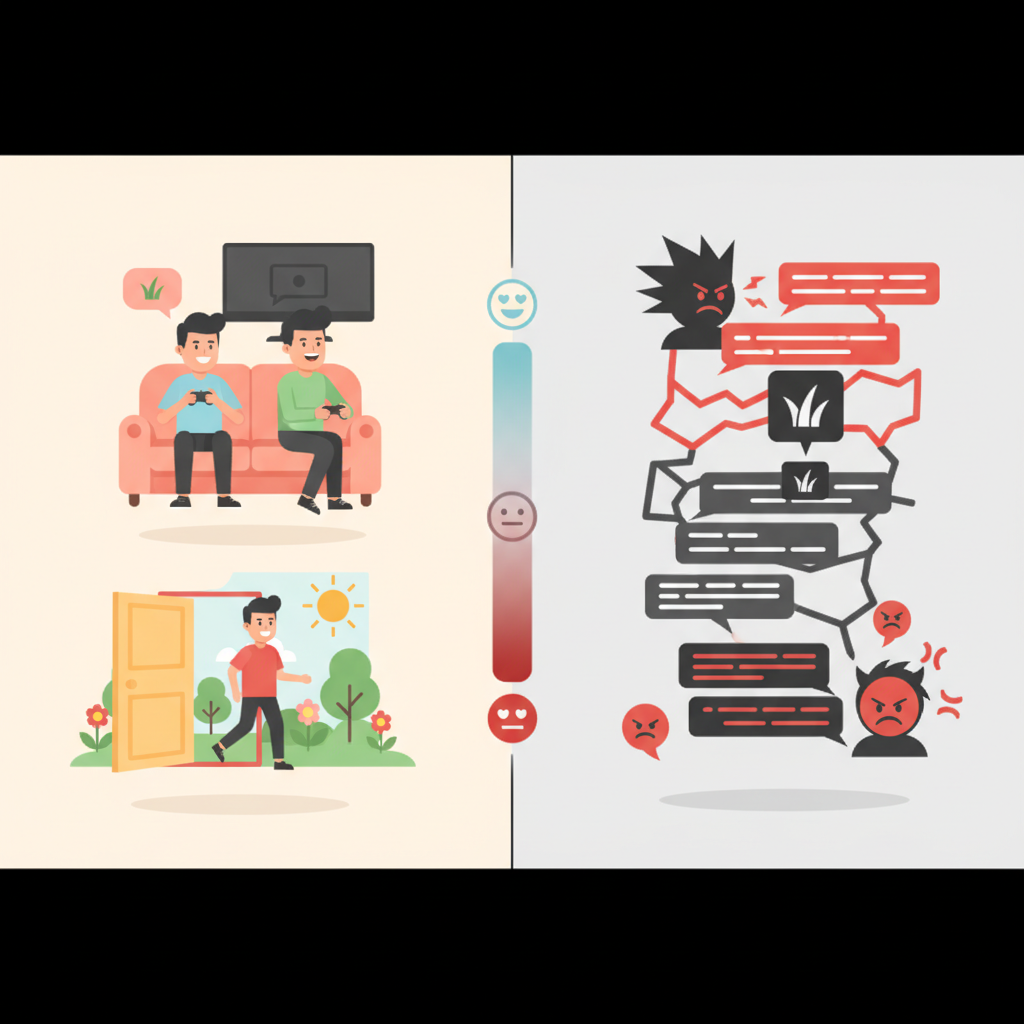
Why “Grass” Resonates: Symbolism and Science
Grass is shorthand for outdoors, sunlight, and sensory grounding—the opposite of the abstract, disembodied tug-of-war online. Even brief exposure to nature can be restorative. Research in environmental psychology (e.g., attention restoration theory) suggests that natural settings improve mood, reduce stress markers, and help replenish depleted attention. You don’t need a national park: even window views of greenery or short plant-care moments can help.
Literal vs. Metaphorical: You Don’t Have to Touch Blades
“Touch grass” is metaphorical. The spirit is any break that reconnects you to embodied experience:
- Step on a balcony or open a window
- Stretch for five minutes, hydrate, walk the hallway
- Tend a houseplant or sit near a sunny spot
- Listen to outdoor ambient sounds or bird calls
Digital Wellbeing: How a Break Actually Helps
Stepping away interrupts outrage loops, reduces physiological arousal, and gives your prefrontal cortex space to re-engage. You can:
- Reduce impulsive replies and pile-ons
- Reassess facts and sources more calmly
- Decide whether the thread deserves your time at all
- Return with clearer intentions and stronger boundaries
Risks and Misfires: When “Touch Grass” Harms More Than Helps
- Invalidating lived experience: using it to shut down discussions of harm or discrimination
- Ableism: ignoring mobility, access, or health constraints that limit outdoor options
- Power dynamics: brands, moderators, or coworkers using it as top-down snark
- Crisis contexts: deploying meme advice during emergencies or trauma disclosures
Etiquette: Use Pauses, Not Putdowns
Good practice is to invite breaks respectfully, without ending the conversation by fiat. Try:
- “Let’s take a break and revisit with fresh eyes.”
- “I’m stepping away for a bit; back later.”
- “This is intense—can we pause and return with sources?”
Supportive Alternatives and Inclusive Phrasing
Below are gentler options that align with digital wellbeing and access considerations.
| Alternative | Best Use | Inclusivity Notes |
|---|---|---|
| “Log off for a bit.” | General social threads and chats | Neutral tone; avoids outdoor assumptions |
| “Take a walk if that’s feasible.” | When movement can help | Adds conditional phrasing to avoid ableism |
| “Hydrate and stretch—then recheck.” | Rapid resets during work or gaming | Embodied cues that are widely accessible |
| “Pause notifications for 30 minutes.” | Overwhelm from alerts and mentions | Works even in low-access contexts |
| “Sleep on it; reply tomorrow.” | High-emotion debates | Encourages reflection, lowers arousal |
| “Step away for a breather.” | Any tense exchange | Inclusive and non-specific |
| “Get some fresh air if you can.” | Outdoor-friendly moments | Conditional phrasing considers constraints |
| “Find a grounding activity that works for you.” | Personalized wellbeing | Respects different bodies and contexts |
Quick Break Ideas That Practically Work
- Five-minute stretch or posture reset
- Balcony or window fresh air
- Hallway walk
- Plant-care moment: water, prune, observe
- Box breathing: inhale 4, hold 4, exhale 4, hold 4
- Listen to outdoor ambient sounds or nature loops
A Simple Micro-Routine to Reset
- Take a 10-minute walk (or equivalent movement)
- Seek sunlight if available (even near a window)
- Sip water slowly
- Name five sensory inputs: what you see, hear, feel, smell, taste
- Set a re-entry intention: clarify your goal before replying or posting
![flowchart]()
Urban Realities and Seasonal Constraints
Not everyone has lawns or parks nearby. Consider:
- Courtyards, rooftops, stairwells with windows
- Houseplants, community gardens, pocket parks
- Open windows and fans for ventilation
- Nature video loops, soundscapes, or virtual tours
- Indoor “green” cues: photos, prints, natural textures
Climate and air quality matter. In heat waves, extreme cold, or poor air days, prioritize safety. Indoor grounding can effectively substitute.
Professional Contexts: Think Twice Before Using It at Work
Telling coworkers to “touch grass” can read as disrespectful or flippant. Instead:
- Suggest structured breaks or meeting pauses
- Encourage turning off notifications during deep work
- Offer evidence-based wellbeing resources
- Use neutral language: “Let’s take five and reconvene.”
Brands and Community Moderation
Brands wielding meme retorts often trigger backlash. Moderators and social teams should:
- Avoid snark; opt for empathetic messaging
- Provide clear guidelines for civility and sourcing
- Offer cooling-off periods: “Let’s pause; take five and return with sources and civility.”
- Link to mental health resources when appropriate
Generational Nuance and Audience Expectations
- Younger users: may read “touch grass” as meme-speak, sometimes friendly
- Older audiences: may perceive it as rude or dismissive
- Tailor language to the community’s norms and values
Sarcasm, Irony, and Gatekeeping
“Touch grass” can be self-deprecating—“I need to touch grass”—signaling awareness of one’s own spirals. It can also gatekeep: “Touch grass, casual,” aimed at newcomers who don’t share niche knowledge. The impact varies widely: self-directed humor can diffuse tension; gatekeeping can erode community trust.
Identity and Safety: Use Care Around Harm and Discrimination
Avoid deploying “touch grass” in threads where people share experiences of harm, harassment, or discrimination. Focus on listening, validation, and safety. If intensity rises, defer to moderation and resource-sharing rather than meme advice.
Response Strategies: If You’re Told to “Touch Grass”
- Consider whether a short break could help your clarity
- If not, calmly ask for specifics: “Which point seems off?”
- Set boundaries: “I’m stepping away—this isn’t constructive”
- Disengage from bad-faith replies or pile-ons
A Simple Decision Flow You Can Use
IF (I’m escalating) OR (facts are unclear) OR (I’m doomscrolling)
THEN take a timed break (5–15 minutes), hydrate, breathe
AFTER break: re-check sources, restate my goal, decide if replying adds value
ELSE
Proceed with a measured response; avoid sarcasm; cite factsWhen Not to Use It
- High-stakes emergencies or crisis updates
- Support conversations around trauma, health, or safety
- Threads requiring expert guidance or urgent collaboration
In these cases, prioritize validation, accuracy, and resource-sharing over meme language.
Language for Moderators
- “Let’s pause; take five and return with sources and civility.”
- “Please avoid personal attacks; focus on verifiable information.”
- “We’re temporarily slowing thread replies to reduce pile-ons.”
SEO-Friendly Subtopics
- Origin of “touch grass”: gaming, Reddit, Twitch, and meme culture
- Meaning in gaming: saltiness, patch notes, meta disputes
- Examples in tweets: clapbacks, duets, stitches
- Alternatives to “touch grass”: inclusive phrasing and wellbeing cues
- Is “touch grass” rude?: tone, context, and audience
- Digital wellbeing tips: breaks, micro-routines, attention restoration
FAQs: Quick Answers
- Is “touch grass” mean-spirited? It depends on tone. Among friends, it can be playful. In public dunking, it often reads as dismissive.
- Does it help? Brief breaks and nature cues can reduce stress and restore attention. Even indoor greenery or window views help.
- Where did it start? Mid-2010s gaming and social platforms—Reddit, Twitter, Twitch—popularized it through meme culture.
- What can I do indoors? Stretch, hydrate, tend plants, open a window, listen to nature sounds, or try a grounding breathing exercise.
- How should brands handle online intensity ethically? Encourage breaks and provide resources; avoid snark or pile-on language.
Balanced Conclusion: Breaks, Grounding, and Respect
So, what does the saying touch grass mean in practice? It’s a shorthand for stepping outside the screen and into grounded, embodied reality. Embrace breaks and mindful resets—they can be powerful. But choose language that supports dialogue, access, and respect. A well-timed pause with inclusive phrasing beats a clever dunk every time.
Your Personal Action Plan
- Define break triggers: escalating heart rate, rapid replies, fuzzy facts, doomscrolling
- Pre-write a pause message: “Stepping away—back later with sources”
- Set gentle app limits: notifications off for 30 minutes, nightly wind-down
- Schedule micro-moments with nature: window sun, plant care, short walks where possible
- Reflect after re-entry: Did the break help? Did I add value? Should I disengage?
A little fresh air—literal or symbolic—can turn noisy threads into opportunities for clearer thinking and kinder conversation.
Summary and Next Step
“Touch grass” means pausing the internet vortex to regain perspective—ideally with a quick, grounding reset. Use it thoughtfully, avoid dismissiveness, and favor inclusive alternatives when in doubt. If this helped clarify what the saying touch grass means, try one micro-routine today and share this guide with a friend who might need a gentle nudge to log off.

